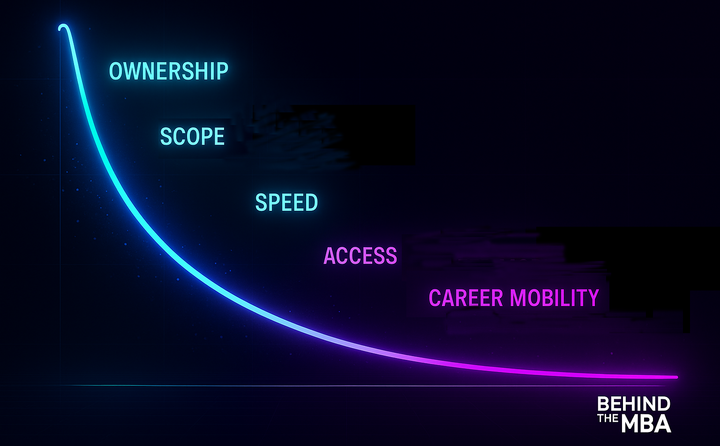The Misconceptions That are Keeping MBAs Away from Tech Recruiting

While everyone debates whether "tech is dead" for MBAs and market challenges persist, there are several myths that keep candidates from landing great opportunities.
I've spent more than a decade in tech and guided hundreds of MBA candidates through career transitions. While the days of hiring huge classes of PMs are over, I'm consistently surprised by how many great candidates are sitting on the sidelines based on bad assumptions about the tech job market.
The myths that are holding you back
Myth #1: "You Need to Code to Work in Tech"
This is a big one, and I've seen MBA students avoid tech companies because of it.
The reality is that most business roles at tech companies don't require you to code at all – THANK GOD! These roles include product marketing, business development, operations, strategy, customer success, and analytics roles. To be successful in these roles, you need business acumen, not programming expertise.
However, for any of these roles, you DO need some level of tech fluency. In other words, you need to understand how tech works, how it touches your function, and how to communicate with tech teams (if your role requires it).
So, if you're interested in tech, but aren't learning how to code... don't let that stop you. AI tools will help pick up the slack, and your AI fluency trumps your ability to code any day.
Myth #2: "Product management is the only role for MBAs"
PM has traditionally been a strong path for MBA grads. It still is, but the competition for the roles offered through structured (on-campus) recruiting is pretty stiff. Without prior PM or engineering experience, it's a tough sell. So, if you're interested in breaking into tech, consider alternatives.
In reality, some of the best tech careers are in other areas (outside of PM). For example, revenue operations (RevOps) roles can feed into leadership positions. Business development (BD) or sales roles could lead to CRO positions. Product marketing roles (where I started) can lead to a VP of Marketing job (exactly where I landed!)
If you're targeting PM, though, there are still opportunities. Aakash Gupta, a must-follow for anyone interested in product management, has been talking a lot about the rise of AI PM roles. This corner of the market has been growing significantly – and the pay is solid!
Myth #3: "Only big tech companies offer great opportunities"
A lot of candidates interested in tech careers are obsessed with joining FAANG companies. I get it – the name recognition is strong, there are opportunities to move laterally or up, and the compensation is awesome.
However, if you have tunnel vision on FAANG companies, you're missing thousands of opportunities at much smaller companies. Here's a dose of reality: The most interesting opportunities might be with companies you have never heard of.
I've worked at seed, and Series A-D companies, and I can say – without a doubt – that my best learning experiences were at the smaller organizations that were less mature... but on strong growth trajectories. And, guess what? I had the opportunity to drive some of that growth!
I understand that candidates worry about risk and losing their jobs – it's a fair concern. Josh Cohen touched on that in our recent conversation. Small companies may seem too risky to commit to... but big companies are risky, too. You've probably noticed that Meta, Amazon, and other big tech companies have been laying employees off in 2025. This can happen anywhere.
The bottom line is that your potential to make an impact at a smaller organization is much more significant than it is at a FAANG company.
Myth #4: "Tech hiring is frozen"
Layoff headlines have helped shaped this narrative.... but that's only part of the story. While some companies are reducing headcount, there are plenty of startups that are growing – aggressively.
Dig a little deeper to understand the market realities. Companies are still hiring – but maybe not where they have in years' past. Instead, they are hiring for specific needs (yes, in business), particularly in AI-focused roles.
The companies that are making the news don't represent the entire tech industry. For example, AI companies with product-market fit are growing quickly. B2B SaaS is still growing. Fintech is coming back. Healthcare tech is also on the rise.
Myth #5: "You need previous tech experience"
I'm not going to lie... previous experience really helps. As Josh Cohen says, "You have to do the job in order to get the job." However, transferable skills will also work.
Today's reality is that tech companies are constantly hiring from outside the industry. Tech companies hire bankers, consultants, and all sorts of professionals from other industries. It's not always easy to break in – but it happens every day.
You need to think strategically about where your skills and prior experiences make sense and will transfer. Then, be incredibly strategic on which types of companies and roles to target.
The hidden opportunities
Tech roles are evolving, and there are certainly areas where MBAs can contribute. These include:
- AI strategy and implementation
- Revenue operations (RevOps)
- Industry-specific roles
- Business development and partnerships
- Marketing and sales
What you need to succeed
Business acumen > tech skills
The MBAs succeeding in tech aren't usually the most technical. Instead, they understand business problems and can communicate effectively across technical and non-technical stakeholders.
So, if you're targeting tech roles, focus on:
- Understanding your market and customer
- Developing knowledge of the business model (ie. B2B, B2C, SaaS, etc.)
- Improving your cross-functional communication skills
- Data-driven decision making
- Strategic problem-solving
"I want to work in tech" won't cut it
You need to get more specific. For example, focus on the types of problems you want to solve – and for whom: "I want to market B2B SaaS platforms to help SMBs improve front-office operations and attract more customers." Refine this over time and as needed.
Network strategically
Many companies use just-in-time hiring for these types of roles. So, candidates need to lean into their networks. Network and connect with:
- MBA alumni in various tech roles (not just your targets)
- Startup founders in your target industries
- Engineers and product professionals
- Investors focused on your areas of interest
What actually works
Start with your role and work outward
Doug Massa from Haas talks about the Role –> Industry –> Company framework in this post.
Target growth-stage companies
Find Series A-C companies where you can actually make a difference. You can identify some of them and job opportunities on LinkedIn, but you will also need to look at different types of job boards. Here are a few of my favorites:
This is just a starting point... but there are many platforms where smaller startups are looking for great talent!
Play the long game
The first tech role out of b-school isn't the final stop. In contrast, the best tech careers are built over multiple roles and companies. The first job just gets you into the industry and provides learning opportunities. From there, you build!
Hope this helps frame what's possible in today's tech market. Any important roles or points I missed? Let me know at laura@behindthemba.com. Subscribe to our newsletter to get insights delivered straight to your inbox.



